Call of Dates, or How did the second hackathon Mail.Ru Mail
July 14-15 Mail.Ru Mail held its second hackathon SmartMail Hack 2: Call of Data. Participants needed to develop a new, interesting and useful solution for presenting data from the Post. And in hot pursuit we hurry to tell about the projects that won at the hackathon.
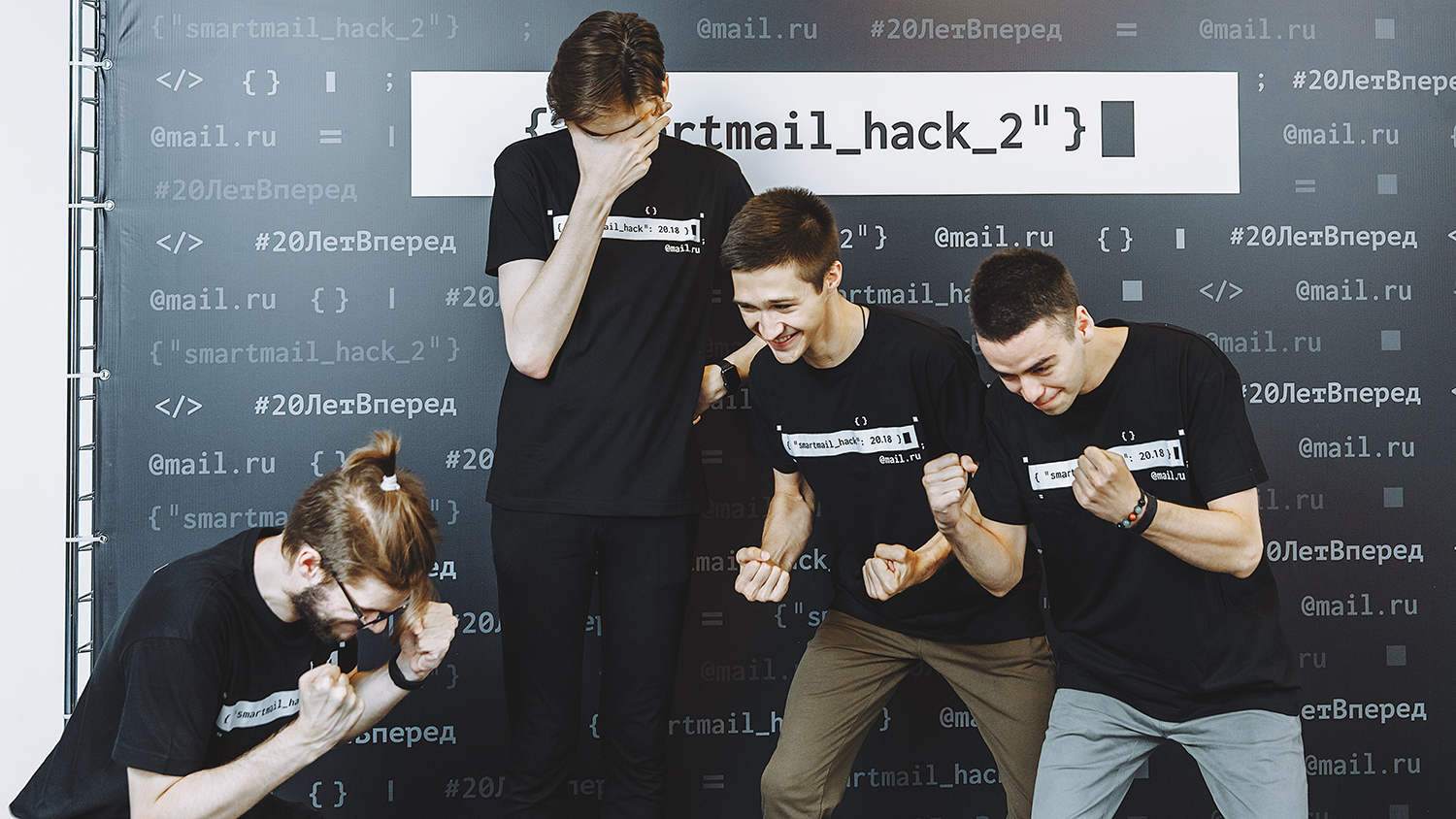
Recall introductory:
29 hours were allotted for the solution of problems, another 3 - for the pitches of the jury. The hackathon began at 11 o'clock in the afternoon.
The jury of the hackathon included the product director of Mail.Ru Mail, Ivan Myzdrikov, technical director of the Post Andrei Sumin, head of machine learning, Eduard Tyantov, and lead designer of the Post, Artem Gladkov.
At the entrance, each team received:
We also immediately sent the teams the criteria by which the jury will evaluate the projects:
And yet each of the jury members could put an additional point from themselves to the projects they liked.
16 teams started working. The list of participants turned out to be diverse: there were students, employees of IT companies, representatives of IT departments of banks, freelance developers. The range of projects also turned out to be wide: from ML classifiers to parse mailings and rethink the Mail interface as an instant messenger.
The choice was coming difficult. Pitches took more than three hours. In the process, they were knocked out of the standard at 10 minutes per pitch several times, including the presentation of the prototype of the jury, because some projects were particularly interesting to make out in more detail. And at some point we brought a whole bunch of burgers that just needed to be eaten urgently.
Full command results:

And now let's talk about the most interesting projects of the hackathon. Let's start with the winners.
The first place was taken by the project team called " Stack of five neurons ." The guys offered for the mailing lists tiled division into categories - SmartView.
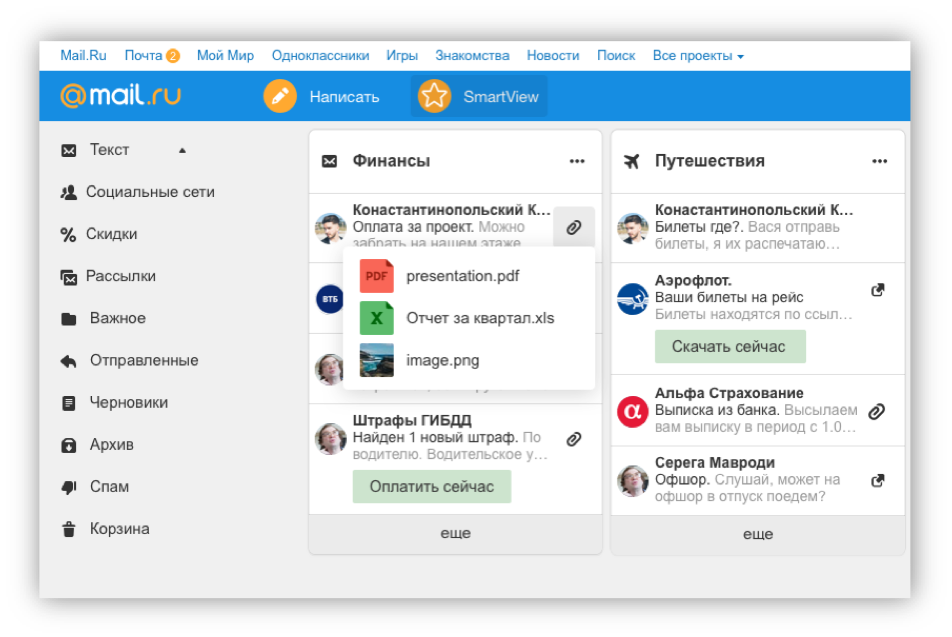
Under the hood of the project - “smart” ranking of letters by relevance, followed by categorization by means of ML.

Later we will separately tell about this project and its implementation. And the prize for the team was a fashionable "big check" for 300,000 rubles. We hope the guys will spend money on something worthwhile :)

The second place was taken by the MailDeal team , which offered the removal of discounts from mailings in the Mail in the form of a timeline. Their prize was a check for 200,000 rubles.

The guys showed a working prototype and successfully defended it in front of the jury. The project consists of a loader of letters and a parser. Information related to discounts is searched (amount and validity period), and then all data is displayed on the site in the form of timelines and individual cards.

In third place was the team Jet.Mail from St. Petersburg, which proposed a rethinking of the Mail interface under the instant messenger.
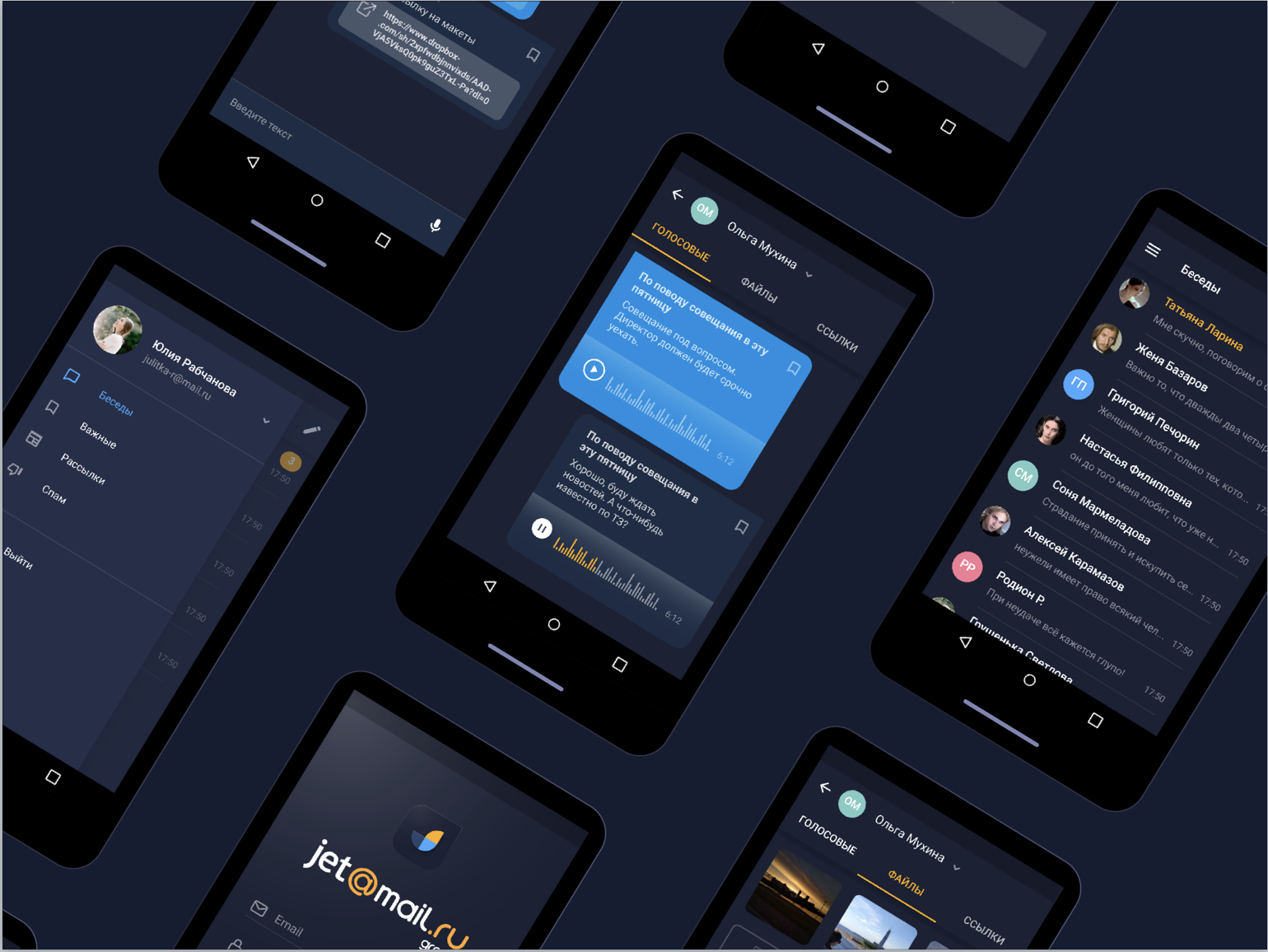
The idea is popular, and the guys managed to successfully implement it in a tangible application for Android. They worked on the problem that the topics of correspondence in the mail often change and often interlocutors may lose their train of thought because of this. As a result, the dialogues were built in the form of a single tape with the ability to filter messages by topic.
The reward was a check for 100,000 rubles.
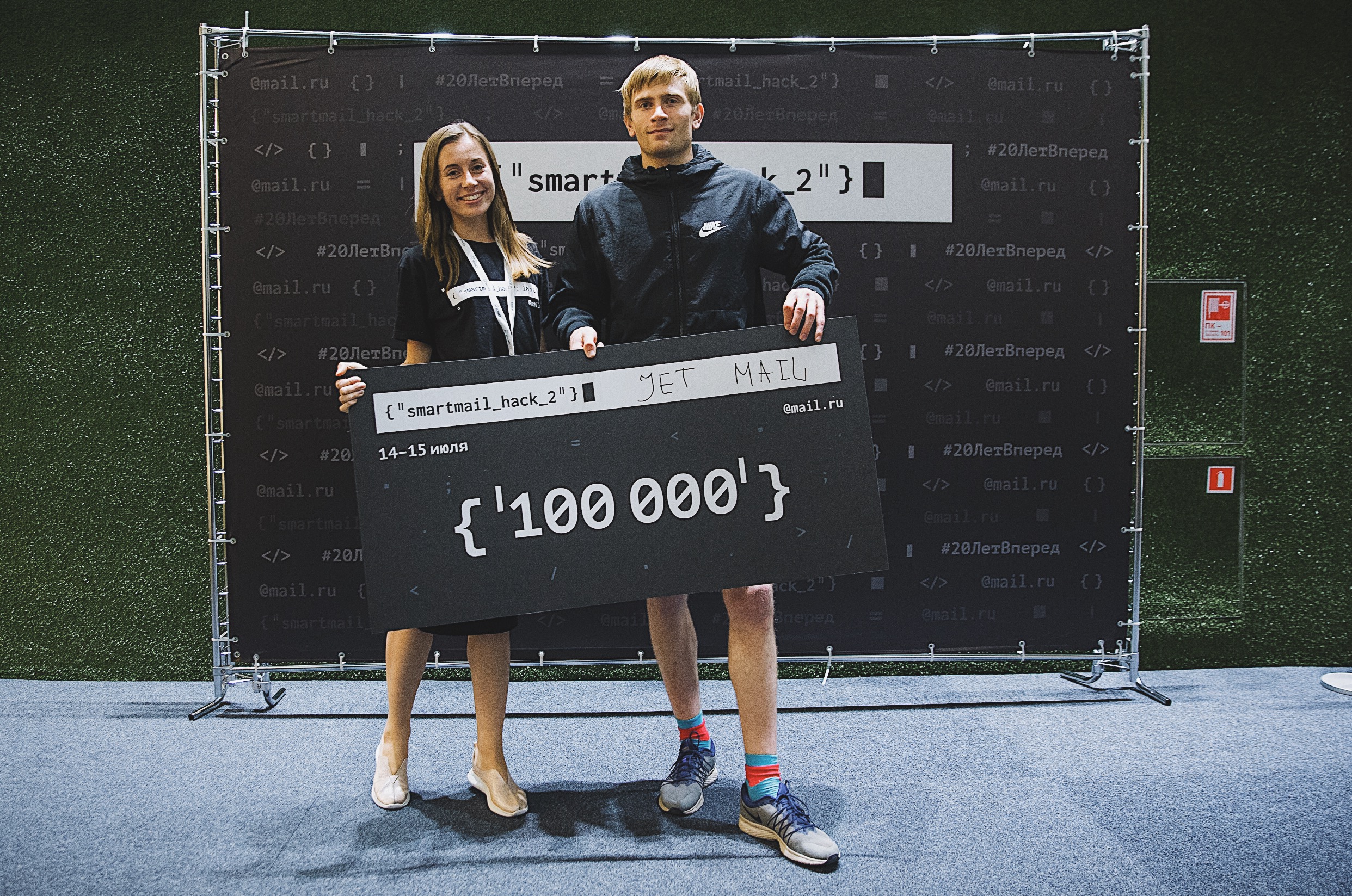
All projects on the hackathon turned out to be interesting, and it would not be fair to mention only the winners.
The jury was given special attention by the OneLayerNetwork team , which offered an ML document search solution in the Post (a classifier capable of recognizing single-page PDF documents) and a document filter by content, for example, helping to quickly find plane tickets:

The team was awarded a special jury prize of 100,000 rubles .

All the tasks that the teams worked on can be divided into three categories:
For example, while working on the sorting of mailing lists, the Geek-s team made a separate service for viewing letters in the form of a graph, classified by topic. It was based on the idea that mailings from online stores can be divided within various categories - promotions, discounts, letters with promotional codes and news.
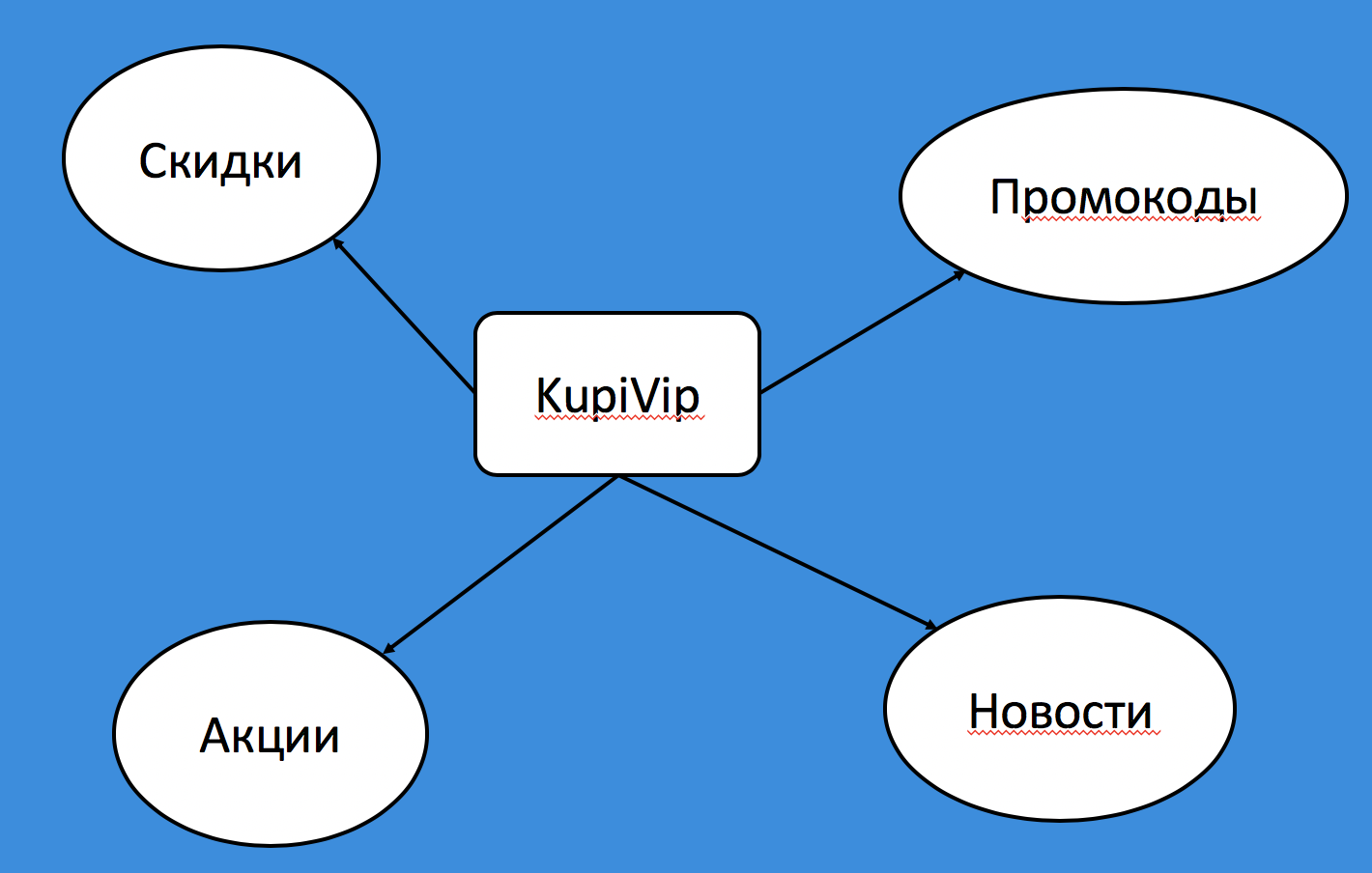
With the interface, the Mails experimented in different ways: from the presentation of letters in the form of cards in the spirit of Slack to the creation of mail messengers. For example, the Resolvers commandsuggested to display the user's correspondence in the form of dialogues. They, like the Jet.Mail team, took the idea that the themes change and the essence of the dialogue may be lost. The guys decided that it would be convenient if the user can send messages that are familiar to him in messengers, and the interlocutors will receive e-mails. At the same time, the authors implemented a quick replacement of the subject of the letter (if it is not changed, the subject of the last letter is automatically put in the letter):

An interesting solution was offered by team members called “ I want to work here". Their idea was to send attachments directly to social networks, bypassing downloading or forwarding letters. This is a fairly frequent use case, for example, when a teacher at an institution of higher education sends a document to the whole group and needs to be urgently forwarded to the general chat in the social network.

Another interesting solution proposed by the eASY team : create Todo lists from Mail for the iOS calendar:
Highly appreciated the jury and the work of the team " Presentation and Prototype ", which made the service a smart reply from the mailings. By the way, Mail.Ru already has such an opportunity - e.mail.ru/settings/cleanmaster . The guys offered to create an application for easy viewing, sorting and unsubscribing from mailings. Moreover, the interface worked very well, for which they received the maximum score of 3 points:
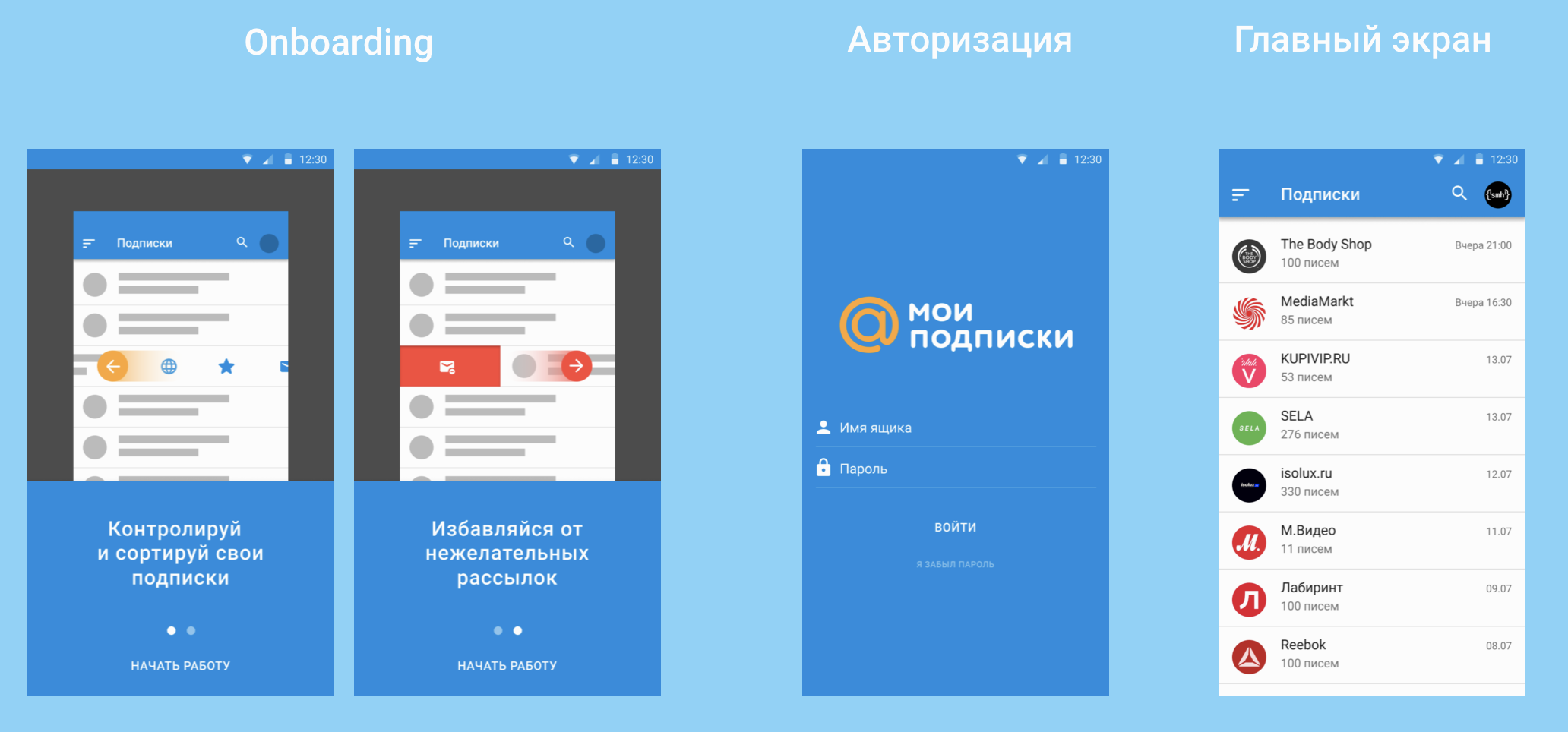
Certainly, rarely when hackathon ideas are immediately implemented in the product. Nevertheless, they always give food for thought, allow you to look at the product from a different angle and often bring in a team of cool young professionals.
16 teams and 16 interesting ideas for Mail.Ru Mail. With a good weekend and the positive mood of all participants. All this was worth the effort. Well, in the end - a small video from the hackathon.
And photos can be viewed here .

How did the hackathon go
Recall introductory:
“We are all used to the fact that Mail is a list of letters sorted by receipt time. But, in fact, Mail is a huge repository of personal data. The history of correspondence, activity over many years, notes, reminders, shopping lists and tasks, files, images, documents, scans of passports and driver's licenses, contracts and a lot of other data.
How can you conveniently and easily access them? What unusual, but mass scenarios are possible? "
29 hours were allotted for the solution of problems, another 3 - for the pitches of the jury. The hackathon began at 11 o'clock in the afternoon.
The jury of the hackathon included the product director of Mail.Ru Mail, Ivan Myzdrikov, technical director of the Post Andrei Sumin, head of machine learning, Eduard Tyantov, and lead designer of the Post, Artem Gladkov.
At the entrance, each team received:
- list of methods and description of the Mail API,
- authorization access token,
- a test mailbox filled with various letters
- and design layouts of the current Mail.Ru Mail.
We also immediately sent the teams the criteria by which the jury will evaluate the projects:
- How framed and formulated the idea of the project? (0-3 points)
- How much does the solution respond to the hackathon's task “Presentation of data from Mail.Ru Mail?” (0–3 points)
- Is the project a solution to the specific task of Mail.Ru Mail users? (0-3 points)
- How developed is the project prototype? (0-3 points)
- How developed the design of the project? (0-3 points)
- How applicable is the project in the current Mail.Ru Mail? (0—1 point)
And yet each of the jury members could put an additional point from themselves to the projects they liked.
16 teams started working. The list of participants turned out to be diverse: there were students, employees of IT companies, representatives of IT departments of banks, freelance developers. The range of projects also turned out to be wide: from ML classifiers to parse mailings and rethink the Mail interface as an instant messenger.
The choice was coming difficult. Pitches took more than three hours. In the process, they were knocked out of the standard at 10 minutes per pitch several times, including the presentation of the prototype of the jury, because some projects were particularly interesting to make out in more detail. And at some point we brought a whole bunch of burgers that just needed to be eaten urgently.
Full command results:

And now let's talk about the most interesting projects of the hackathon. Let's start with the winners.
Winning projects
The first place was taken by the project team called " Stack of five neurons ." The guys offered for the mailing lists tiled division into categories - SmartView.

Under the hood of the project - “smart” ranking of letters by relevance, followed by categorization by means of ML.

Later we will separately tell about this project and its implementation. And the prize for the team was a fashionable "big check" for 300,000 rubles. We hope the guys will spend money on something worthwhile :)

The second place was taken by the MailDeal team , which offered the removal of discounts from mailings in the Mail in the form of a timeline. Their prize was a check for 200,000 rubles.

The guys showed a working prototype and successfully defended it in front of the jury. The project consists of a loader of letters and a parser. Information related to discounts is searched (amount and validity period), and then all data is displayed on the site in the form of timelines and individual cards.

In third place was the team Jet.Mail from St. Petersburg, which proposed a rethinking of the Mail interface under the instant messenger.

The idea is popular, and the guys managed to successfully implement it in a tangible application for Android. They worked on the problem that the topics of correspondence in the mail often change and often interlocutors may lose their train of thought because of this. As a result, the dialogues were built in the form of a single tape with the ability to filter messages by topic.
The reward was a check for 100,000 rubles.

And many others
All projects on the hackathon turned out to be interesting, and it would not be fair to mention only the winners.
The jury was given special attention by the OneLayerNetwork team , which offered an ML document search solution in the Post (a classifier capable of recognizing single-page PDF documents) and a document filter by content, for example, helping to quickly find plane tickets:

The team was awarded a special jury prize of 100,000 rubles .

All the tasks that the teams worked on can be divided into three categories:
- classification and sorting of letters and files,
- redefining the mail interface
- and the development of utilitarian internal features to help users.
For example, while working on the sorting of mailing lists, the Geek-s team made a separate service for viewing letters in the form of a graph, classified by topic. It was based on the idea that mailings from online stores can be divided within various categories - promotions, discounts, letters with promotional codes and news.

With the interface, the Mails experimented in different ways: from the presentation of letters in the form of cards in the spirit of Slack to the creation of mail messengers. For example, the Resolvers commandsuggested to display the user's correspondence in the form of dialogues. They, like the Jet.Mail team, took the idea that the themes change and the essence of the dialogue may be lost. The guys decided that it would be convenient if the user can send messages that are familiar to him in messengers, and the interlocutors will receive e-mails. At the same time, the authors implemented a quick replacement of the subject of the letter (if it is not changed, the subject of the last letter is automatically put in the letter):

An interesting solution was offered by team members called “ I want to work here". Their idea was to send attachments directly to social networks, bypassing downloading or forwarding letters. This is a fairly frequent use case, for example, when a teacher at an institution of higher education sends a document to the whole group and needs to be urgently forwarded to the general chat in the social network.

Another interesting solution proposed by the eASY team : create Todo lists from Mail for the iOS calendar:
Highly appreciated the jury and the work of the team " Presentation and Prototype ", which made the service a smart reply from the mailings. By the way, Mail.Ru already has such an opportunity - e.mail.ru/settings/cleanmaster . The guys offered to create an application for easy viewing, sorting and unsubscribing from mailings. Moreover, the interface worked very well, for which they received the maximum score of 3 points:

Conclusion
Certainly, rarely when hackathon ideas are immediately implemented in the product. Nevertheless, they always give food for thought, allow you to look at the product from a different angle and often bring in a team of cool young professionals.
16 teams and 16 interesting ideas for Mail.Ru Mail. With a good weekend and the positive mood of all participants. All this was worth the effort. Well, in the end - a small video from the hackathon.
And photos can be viewed here .
